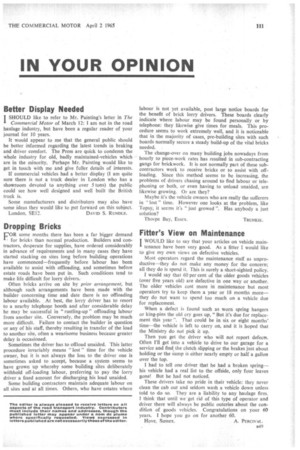IN YOUR OPINION
Page 113

If you've noticed an error in this article please click here to report it so we can fix it.
Better Display Needed
SHOULD like to refer to Mr. Painting's letter in The I Commercial Motor of March 12: I am not in the road haulage industry, but have been a regular reader of your journal for 10 years.
It would appear to me that the general public should be better informed regarding the latest trends in braking and driver comfort. The Press are quick to condemn the whole industry for old, badly maintained-vehicles which are in the minority, Perhaps Mr. Painting would like to get in touch with me and give fuller details of interests.
If commercial vehicles had a better display (I am quite sure there is not a truck dealer in London who has a showroom devoted to anything over 5 tons) the public could see how well designed and well built the British truck is.
Some manufacturers and distributors may also have some ideas they would like to put forward on this subject.
London, SE12. DAVID S. RUNDLE.
Dropping Bricks
pOR some months there has been a far bigger demand
for bricks than normal production. Builders and contractors, desperate for supplies, have ordered considerably in advance of requirements and in many cases they have started stacking on sites long before building operations have commenced—frequently before labour has been available to assist with offloading, and sometimes before estate roads have been put in. Such conditions tend to make life difficult for lorry drivers.
Often bricks arrive on site by prior arrangement, but although such arrangements have been made with the builder concerning time and date there is no offloading labour available. At best, the lorry driver has to resort to a nearby telephone booth and after considerable delay he may be successful in " rustling-up" offloading tabour from another site. Conversely, the problem may be much more difficult. Failure to contact the builder in question or any of his staff, thereby resulting in transfer of the load to another site, often a wearisome business because greater delay is occasioned.
Sometimes the driver has to offload unaided. This latter procedure invariably means " lost " time for the vehicle owner, but it is not always the loss to the driver one is sometimes asked to accept, because a system seems to have grown up whereby some building sites deliberately withhold off-loading labour, preferring to pay the lorry driver a fixed amount for discharging his load unaided.
Some building contractors maintain adequate labour on all sites and at all times. Others, who have estates where labour is not yet available, post large notice boards for the benefit of brick lorry drivers. These boards clearly indicate where labour may be found personally or by telephone: they likewise give times for meals. This procedure seems to work extremely well, and it is noticeable that in the majority of cases, pre-building sites with such boards normally secure a steady build-up of the vital bricks needed.
The change-over on many building jobs nowadays from hourly to piece-work rates has resulted in sub-contracting gangs for brickwork. It is not normally part of these subcontractors work to receive bricks or to assist with offloading. Since this method seems to be increasing, the -problems of drivers chasing around to find labour or telephoning or both, or even having to unload unaided, are likewise growing. Or are they?
Maybe it's the vehicle owners who are really the sufferers " lost" time. However one looks at the problem, like Topsy, it seems it's "just growed ". Has anybody a just solution?
Thorpe Bay, Essex. TRUNKW.
Fitter's View on Maintenance
I WOULD like to say that your articles on vehicle maintenance have been very good. As a fitter I would like to give my own views on defective vehicles.
Most operators regard the maintenance staff as unproductive—they do not make any money for the concern; all they do is spend it. This is surely a short-sighted policy.
I would say that 60 per cent of the older goods vehicles (over five years old) are defective in one way or another. The older vehicles cost more in maintenance but most operators try to keep them a year or 18 months more— they do not want to spend too much on a vehicle due for replacement.
When a defect is found such as worn spring hangers or king-pins the old cry goes up, "But it's due for replacement this year ". That could be in six or eight months' time—the vehicle is left to carry on, and it is hoped that the Ministry do not pick it up.
Then you get the driver who will not report defects. Often I'll get into a vehicle to drive to our garage for a service and find the clutch slipping or the brakes just about holding or the sump is either nearly empty or half a gallon over the top.
I had to tell one driver that he had a broken spring— his vehicle had a real list to the offside, only four leaves gone! But he had not noticed.
These drivers take no pride in their vehicle: they never clean the cab out and seldom wash a vehicle down unless told to do so. They are a liability to any haulage firm. I think that until we get rid of this type of operator and driver there will always be public outcries about the condition of goods vehicles. Congratulations on your 60 years. 1 hope you go on for another 60.
Hove, Sussex. A. PERCIVAL.


































































































































































